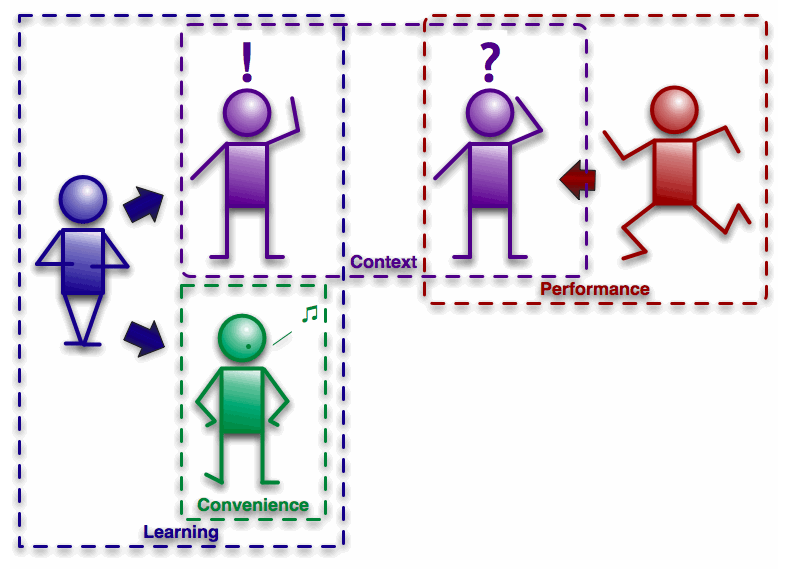What are the real opportunities in mobile learning?
One of the several sessions I’m doing at DevLearn next week (in addition to a pre-conference workshop with Jay Cross, a mobile development session with Richard Clark, and another session on the future of orgnanizational learning) is a mobile learning design introduction. In thinking through it, I reflected on a distinction I make between convenience and contextualization, and as usual I got into diagramming as a way to get a handle on it.
 I’ve argued before that mobile is not really about learning, but about performance support. That said, there are roles for mobile in courses, either as a learning augment or even microcourses (but not putting a whole elearning course on a mobile device). In talking about mobile, I distinguish between convenience and context.
I’ve argued before that mobile is not really about learning, but about performance support. That said, there are roles for mobile in courses, either as a learning augment or even microcourses (but not putting a whole elearning course on a mobile device). In talking about mobile, I distinguish between convenience and context.
Convenience is when you access content at a time that’s not at work but you have free. So, listening to a podcast while commuting, or viewing a video while waiting in the queue at the grocery store, both would qualify. So would doing a little quiz while waiting for your flight, or reading a document on that flight.
Contextualization, on the other hand, is much more specific. Here, you’re doing something relevant to where you are. In performance support, this is a huge opportunity: providing location specific information (about this device, or this client), or event-based support (providing a quick reference sheet for a negotiation, having a reflection session afterward).
Even for learning, however, there could be specific location information (“this is where X happened”, or “an application of Y is seen here, where…”). That can be enacted by the device sensing location (GPS, RFID, etc), or by actively reading a location marker (cf QR code). Similarly, event information could be provided (“for your review meeting, remember to focus on the behavior, not the individual”).
The point is that while convenience is a win, contextualized information is the big win. It takes a bit more design, but by doing it systemically, the opportunities for really relevant learning are definitely worth considering.
So, are you saying that you do not recommend using mobile devices for publishing an entire course of study? Does this hold true even in the formal setting where learners would still be involved in formal learning, but the mobile device is the main medium for accessing course materials, and interaction?
Richard, while there have been wins where a full course on a mobile device worked, in my mind it’s not the way to bet. Of course, it depends on the scope of your course; I could see small objectives getting met, or if a mobile device is your *only* device (cf some of the developing world), or if the mobile device has a reading-worthy screen (cf Kindle), but in general I’d use the mobile device more for quick access (cf The Zen of Palm) rather than a full university course.